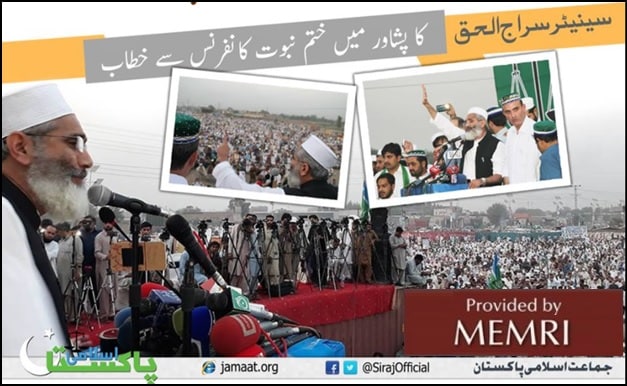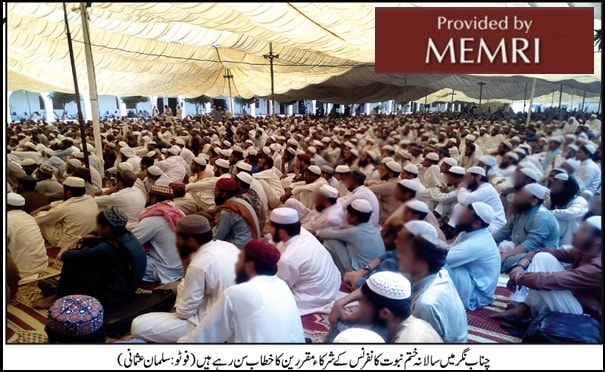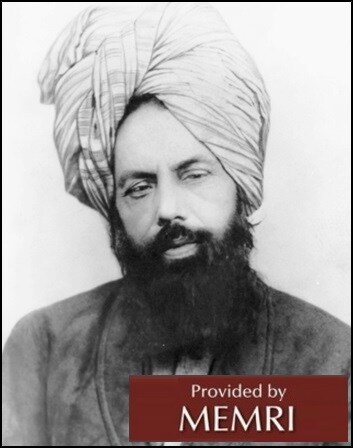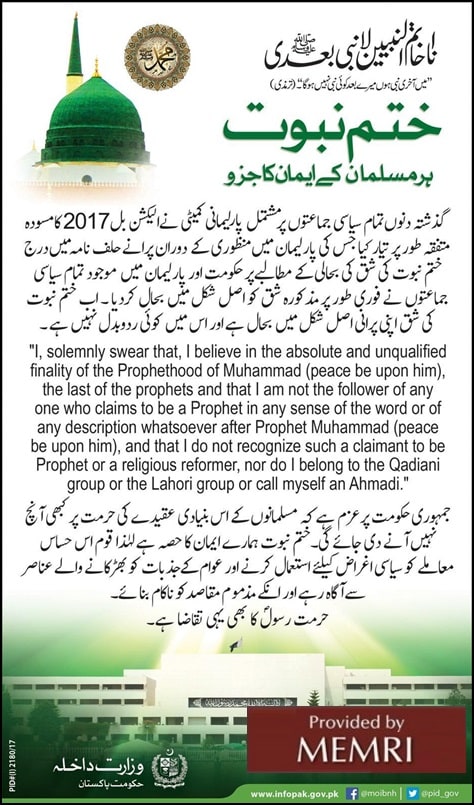
Jamaat-e-Islami leader Sirajul Haq addresses a Khatm-e-Nabuwwat conference in Peshawar.
Introduction
During September-October 2017, a major controversy led by Islamic clerics in Pakistan arose after a law was amended to reform the country's elections. At issue was Form-A, a form submitted by candidates running for election. elections. In the amended Form-A, the words "I solemnly swear" were replaced with "I declare," in a clause relating to a candidate's faith in Khatm-e-Nabuwwat, or the finality of the prophethood of Muhammad. The clerics forced the government to revert to the original "I solemnly swear" in the Elections Act 2017, which was finally passed on October 5.[1]
Khatm-e-Nabuwwat is the belief that Muhammad was the last prophet. In 1974, the so-called secular leader of Pakistan Zulfiqar Ali Bhutto enacted a law outlawing Ahmadi Muslims as non-Muslims for allegedly not believing in the idea of Khatm-e-Nabuwwat.[2] The law strengthened religious hate against Ahmadi Muslims in Pakistan. Ahmadi Muslims say that they believe that Prophet Muhammad was the last prophet, but that Allah talks to mystics – an argument that mirrors the anti-Ahmadi Islamic clerics' own view that Allah talks to Sufi mystics.
Ahmadi Muslims are pejoratively dismissed as Qadianis, after the town of Qadian in present-day India where their spiritual leader Mirza Ghulam Ahmad (1835–1908) was born and preached. The hatred against Ahmadi Muslims that began with the 1974 law was further cemented in Pakistani society by Pakistan's Islamist military ruler General Zia-ul-Haq in 1984 when he amended laws, forbidding Ahmadis from using Islamic symbols, calling their places of worship "mosques," describing their call to prayer as the azaan, and so on.[3] The anti-Ahmadi hate has grown so deep in Pakistan now that journalists or others can be arrested for describing Ahmadis as Muslims.
Although the Elections Act 2017 was passed on October 5 to the satisfaction of Islamic clerics in Pakistan, numerous anti-Ahmadi conferences and seminars continued being organized by them almost every day across Pakistan. The Urdu media, which exercises overwhelming influence on public opinion, was full of hateful statements from Islamic clerics and Pakistani politicians against Ahmadi Muslims, both before and after the passing of the new election law. Islamic clerics across Pakistan held two-day conferences on October 19-20, 2017, on the issue of Khatm-e-Nabuwwat. This paper reviews the proceedings of these conferences, especially the statements made there by Islamic clerics. In doing so, this paper relies mainly on Urdu media sources.
The Organizers Of The Khatm-e-Nabuwwat Conferences

Thousands of devout Muslims attend the Khatm-e-Nabuwwat Conference in Chenab Nagar.
The October 19-20 conferences and public rallies on Khatm-e-Nabuwwat were organized following a call by Senator Sirajul Haq, the emir of Jamaat-e-Islami Pakistan, and the World Pasban-e-Khatm-e-Nabuwwat ("The World Guardians of Khatm-e-Nabuwwat"). After the call by Senator Sirajul Haq and the World Pasban-e-Khatm-e-Nabuwwat, Islamic clerics in Pakistan organized numerous conferences, rallies, events at mosques, and protests under different banners. The Islamic clerics who were part of these two-day events run their own organizations. Some of the lead organizations that held countrywide conferences and events included:[4]
Jamiat Ulema-e-Pakistan ("The Organization Of Islamic Scholars Of Pakistan"), Tehreek-e-Tahaffuz-e-Harmain Sharifain ("The Movement For The Defense Of The Holy Places In Mecca And Medina"), Jamiat Ulema-e-Islam ("The Organization Of Religious Scholars Of Islam"), Jamaat-e-Islami Pakistan, Jamiat Ahle Hadith, Jamiat Ahle Sunnat, Tahreek-e-Millat, Tehreek-e-Tahaffuz-e-Khatm-e-Nabuwwat ("The Movement For The Defense Of The Finality Of Prophethood"), Tehreek-e-Millat-e-Jafria, and Tanzeem Ulema aur Mashaikh-e-Ahle Sunnat ("The Organization Of Islamic Scholars And Mystics Of The Sunnah Groups"), and the Sunni Supreme Council, among others.
The events were organized in all major cities in Pakistan including Karachi, Lahore, Islamabad, Rawalpindi, Peshawar, Hangu, and others. In Punjab, which is the most populous province of Pakistan, numerous meetings, conferences and rallies were organized at the call of Mian Maqsood Ahmad, the emir of the Jamaat-e-Islami's Punjab branch, in the towns of Lahore, Gujranwala, Sargodha, Multan, Sahiwal, Dera Ghazi Khan and Faisalabad, among others.[5]
The main conference was organized at Chenab Nagar in Punjab province by the Alami Majlis-e-Tahaffuz-e-Khatm-e-Nabuwwat ("The International Assembly For The Defense Of The Finality Of The Prophethood"). The conference was addressed by leading Islamic scholars, including Sufis: Sahabzada Khwaja Aziz Ahmad, Ibtisam Elahi Zaheer, Pir Hafiz Nasiruddin Khakwani, Khwaja Khalil Ahmad, Ziaullah Shah Bukhari, Maulana Jawed Hussain Shah, Maulana Muhibullah, Maulana Abdul Ghafoor, Maulana Fazlur Rahman, Maulana Pir Zulfiqar Naqshbandi, Maulana Azizur Rahman Jalandhari, Liaqat Baloch, Maulana Mufti Khalid Mahmood, Maulana Qazi Ehsan Ahmad, Maulana Mufti Rashid Madani, Pir Azizur Rahman Hazarvi, Syed Salman Geelani, and scores of other religious scholars.[6]
"It Is Necessary For The Country's Integrity And Stability To Strictly Monitor The Qadianis Who Have Dual Citizenships And Green Cards"
As per a media report, approximately 150,000 people attended the main conference in Chenab Nagar, where more than 2,000 volunteers provided security arrangements.[7] According to a report in the Urdu daily Roznama Express, the speakers at the main conference said that "as long as the Qadianis are occupying important positions, peace cannot be established in the country... Therefore, Qadianis should be removed from all important positions [in the military and government of Pakistan]. The Islamiyan [i.e. Islamists] of Pakistan will not allow any pro-Qadiani candidates to succeed in the coming elections."[8] The term "Islamist" is viewed positively by these clerics.
According to a report in the Urdu daily Roznama Ummat, Maulana Azizur Rahman Jalandhari – a key leader of the Alami Majlis-e-Tahaffuz-e-Khatm-e-Nabuwwat – said: "The armed forces of Pakistan are deployed on the protection of the country's territorial borders. And the madrassas [Islamic seminaries] are on duty to defend the country's ideological borders."[9] Maulana Jalandhari also said: "The defenders of Khatm-e-Nabuwwat and the Prophet's honour are deployed on the Prophet Muhammad's personal service..."[10]
Maulana Pir Zulfiqar Naqshbandi told the audiences: "It is necessary for the country's integrity and stability to strictly monitor the Qadianis who have dual citizenships and green cards."[11] Maulana Khyber Azad said: "The Qadiani bureaucrats are on the path of creating a secular state [in Pakistan] by ending the country's Islamic and ideological identity."[12] Maulana Muhammad Waseem Aslam, another Islamic cleric, said: "The Islamists of Pakistan have strong reservations on Qadianis' patriotism."[13]
According to another report in the Urdu daily Roznama Dunya, Islamic religious scholars, speaking on the first day of the conference (October 19), warned: "The defense of Khatm-e-Nabuwwat is not based on logic, but is connected to the prophethood and reverence for it. No power in the world, including America, can have the constitution's law against Qadianism removed. To meddle in the laws on Khatm-e-Nabuwwat is tantamount to playing with fire and blood."[14] As per the report, the clerics warned: "The law against the blasphemy of the Prophet and constitutional amendments concerning Qadianis will be defended at every cost."[15] Maulana Abdul Nayeem Rahmani said that the unity of the Muslim ummah is hidden in the belief of Khatm-e-Nabuwwat.[16]

Mirza Ghulam Ahmad (1835–1908), the spiritual leader of Ahmadi Muslims.
"[The Islamist National Poet] Iqbal Was The First To Demand That Qadianis Be Declared A Non-Muslim Minority And Declared Them Traitors Of The Country And Millat"
Addressing the audiences, Maulana Muhammad Amjad Khan, another Islamic cleric, said: "Qadianis are traitors of the country and Millat [same as Ummah], gumashte [brokers/agents] of the Zionist and imperial powers, and agents of Israel."[17] Maulana Abdul Qayyum Haqqani accused the Ahmadi Muslims of publishing "blasphemous literature" from Chenab Nagar, the new name for Rabwah, the headquarters of the Ahmadi Muslims in Pakistan.[18] Maulana Hakim Nomani, an Islamic cleric, said: "The decision to declare Ahmadis non-Muslims was not of Islamic clerics alone, but of all the Muslims of the world."[19] Maulana Qazi Ehsan Ahmad pointed out: "[The Islamist national poet of Pakistan] Muhmmad Iqbal was the first to demand that Qadianis be declared a non-Muslim minority and declared them traitors of the country and Millat."[20]
According to a report, at the events held in towns across Punjab, "people took part in these protest demonstrations in large numbers in order to ensure the defense of Khatm-e-Nabuwwat and to foil the conspiracies of anti-Islam enemies."[21] Zikrullah Mujahid, one of the speakers, told a rally: "Some forces are active against Pakistan's integrity and its Islamic identity. They must be chopped off in time. It is an international agenda to remove the belief in Khatm-e-Nabuwwat from the constitution of Pakistan."[22]
Islamic clerics also addressed worshippers during the weekly Friday prayers on October 20. Hafiz Muhammad Idrees, the deputy emir of Jamaat-e-Islami Pakistan, told worshippers in Lahore: "The loyalists and instruments of America have run the country's government for 70 years [since Pakistan's creation in 1947], who time and again launch attacks on our beliefs and faith."[23]
According to a report in Roznama Ummat, "Strong slogans were raised against America and Israel in these meetings... and the speakers vowed to foil the objectives of anti-Islam enemies."[24] At an event in the town of Hangu, "Mufti Imran, Maulana Ataullah, Mufti Karim and other elders said that the policies [that were initiated] in the Pakistani parliament against the basic Islamic belief were the unpious conspiracies of America and Israel."[25]
The Conference Resolution: A Column For Religion Should Be Added To National Identity Cards So People Can Distinguish Muslims From Non-Muslims

An advertisement, issued by the Pakistani government in newspapers on the occasion of the two-day conference, declares Khatm-e-Nabuwwat to be part of every Muslim's faith.
On October 20, at the end of the two-day conference in Chenab Nagar, the Islamic clerics also adopted a resolution. Some of the main points of the resolution are summarized below:[26]
1. Qadianis are kafir (unbelievers) and expelled from Islam as per the Koran and Sunnah (traditions of Prophet Muhammad), the consensus of the Ummah, and the 1973 Constitution of Pakistan.
2. The Punjab government must withdraw its pro-Qadiani order, which banned the publication and distribution of posters, stickers, and statements on Khatm-e-Nabuwwat in Lahore, because calling Qadianis kafir is as per the law.
3. The officials who tried to change Form-A in the Elections Act 2017 must be punished so that others must be deterred from such attempts.
4. Qadianis should be removed from all key positions in the government departments across Pakistan.
5. As per the recommendations of the Council of Islamic Ideology (IIC) of Pakistan, the shari'a-based punishment for apostasy (death) should be implemented.
6. The Auqaf (properties held in perpetual trust) of Qadianis should be taken over by the government of Pakistan, as is the case with other non-Muslim minorities.
7. In Chenab Nagar, Qadianis have established their own civil court, high court, and supreme court, which should be taken over by the government.
8. Khuddam-ul-Ahmadiyya – the "armed organization" of Qadianis – should be outlawed and their assets taken over by the government.
9. The conference demands that movies (likely to be released) on the lives of prophets and the Sahaba (Companions of Prophet Muhammad) should be outlawed forthwith.
10. A column for religion should be added in the computerized national identity cards issued by the government so that people can distinguish Muslims from non-Muslims.
* Tufail Ahmad is Senior Fellow for the MEMRI Islamism and Counter-Radicalization Initiative
[1] Roznama Ummat (Pakistan), October 6, 2017.
[2] For a survey of the Khatm-e-Nabuwwat movement, see, Article In Urdu Daily Traces History Of Khatm-e-Nabuwwat Movement, Argues That Ahmadi Muslims Are Kafir: 'This Faith Is Substantiated By 100 Verses Of The Koran', Special Dispatches Series No. 7128, MEMRI, October 15, 2017.
[3] Thepersecution.org/50years/paklaw.html, accessed October 22, 2017.
[4] Roznama Ummat (Pakistan), October 21, 2017.
[5] Roznama Express (Pakistan), October 21, 2017.
[6] Roznama Express (Pakistan), October 21, 2017.
[7] Roznama Ummat (Pakistan), October 20, 2017.
[8] Roznama Express (Pakistan), October 21, 2017.
[9] Roznama Ummat (Pakistan), October 21, 2017.
[10] Roznama Ummat (Pakistan), October 20, 2017.
[11] Roznama Ummat (Pakistan), October 21, 2017.
[12] Roznama Ummat (Pakistan), October 21, 2017.
[13] Roznama Ummat (Pakistan), October 20, 2017.
[14] Roznama Dunya (Pakistan), October 20, 2017.
[15] Roznama Dunya (Pakistan), October 20, 2017.
[16] Roznama Dunya (Pakistan), October 20, 2017.
[17] Roznama Dunya (Pakistan), October 20, 2017.
[18] Roznama Dunya (Pakistan), October 20, 2017.
[19] Roznama Dunya (Pakistan), October 20, 2017.
[20] Roznama Dunya (Pakistan), October 20, 2017.
[21] Roznama Express (Pakistan), October 21, 2017.
[22] Roznama Express (Pakistan), October 21, 2017.
[23] Roznama Express (Pakistan), October 21, 2017.
[24] Roznama Express (Pakistan), October 21, 2017.
[25] Roznama Ummat (Pakistan), October 21, 2017.
[26] Roznama Ummat (Pakistan), October 21, 2017.




